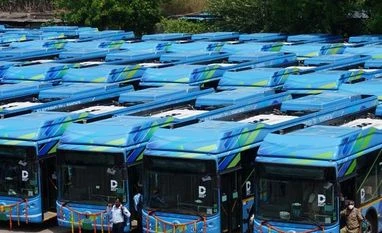The government’s ambitious plan to replace polluting diesel buses at public transporters with electric buses has hit a speed bump. Convergence Energy Services Limited (CESL), the state-run company that handles the acquisition of electric vehicles for central and state government departments, is considering cancelling its dry lease tender for 4,675 e-buses after a disappointing response from original equipment manufacturers (OEMs), Business Standard has learnt.
The tender, issued on January 4 under the National Electric Bus Programme (NEBP) Phase-II, failed to attract bids from established automobile makers such as Tata Motors, Ashok Leyland, and PMI Electro Mobility, leading to speculation about its cancellation.
The lack of participation from major OEMs had led to several extensions of the tender deadline, which eventually closed on June 9. Only EKA by Pinnacle Mobility Solutions bid for the buses. EKA declined to comment, citing its spokesperson’s unavailability.
“As none of the OEMs submitted bids, the tender is likely to be scrapped. We are also considering revisiting the dry lease contracting model for future tenders,” a senior government official confirmed.
Queries sent to CESL did not elicit a response till press time.
OEMs refrained from bidding due to concerns about high operational costs, the financial instability of state transport undertakings (STUs), and apprehensions about relinquishing control of the buses to STU drivers, sources said. Furthermore, the cost of e-buses under the dry lease tender was higher, as they did not qualify for incentives under the Faster Adoption and Manufacturing of (Hybrid &) Electric Vehicles scheme.
In the dry lease contracting model of procurement, the bus is owned and maintained by service providers for a specific rate and contract period, the responsibility of operation is with STUs. The authority pays a pre-decided monthly per-bus fee, discovered through a competitive bidding process, to the service provider. The dry lease period for different bus types (7/9/12 metre bus, standard floor/low floor, and AC/non-AC) is 10 or 12 years.
Also Read
OEMs prefer the gross cost contract model, where drivers also belong to the OEMs and they maintain control of the entire operation. In this model, the authority pays a pre-decided per-kilometre fee. The lease period for different bus types in the gross cost contract model is either 10 years or 12 years (900,000 kilometres or 1.8 million kilometers).
Despite the setback, the government remains determined to electrify buses used for public transport, considering its significant social and environmental impact. In June 2022, it announced an ambitious plan to deploy 50,000 electric buses by 2027 under the $10-billion NEBP initiative. This move is aimed to help India achieve its target of 40 per cent e-bus penetration by 2030 and net neutrality by 2070.
The current situation poses a challenge to the government’s vision, as CESL, under its previous tender, has declared results for approximately 12,050 electric buses. However, the number of operational e-buses in the country is only 4,855, including buses sold outside the tender ambit.
Since 2014, India has sold a total of 430,669 buses, with electric buses accounting for just 1.1 per cent of this. The potential cancellation of the current tender raises concerns, yet the government is expected to review its approach and explore alternatives to accelerate the adoption of electric buses in the country’s public transport system.
OUT OF CHARGE
- Cost of e-buses under the DLC tender was higher as they did not qualify for incentives under the FAME scheme
- 50,000: Buses targeted under NEBP
- 12,050: Electric buses announced to various states by CESL through its previous tender
- 430,669: Total buses sold since 2014
- 4,855: Buses sold since 2014
Source: Vahan
)